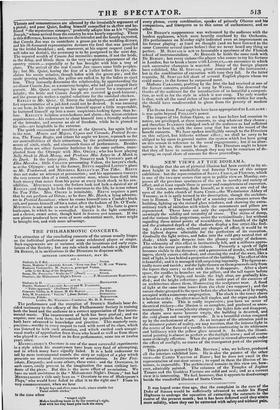THE PHILHARMONIC CONCERTS.
THE attraction of the concluding concerts of the season usually binges on the individual performance of some celebrated player or singer. Such engagements are at variance with the intentions and early regu- lations of the Society ; but any rule which would exclude a player like Dx BERIOT, it is meritorious in the Directors to dispense with.
SEVENTH CONCERT—MONDAY, MAY Z.
ACT I.
Sinfonia ii, E flat SPOHR.
Senna, Madame CARADORI ALLAN, "Fern von ihm" C. M. VON WILBER. Fantasia Violoncello, M. SEHVAIS, piincipal Violore cello to the King of the Belgians SERVAIS. Scene, Mr. Femmes, Stolto me l" (Faust) SPOHR. Overture, the Midsummer Night's Dream F. MENDELSSOHN BARTHOLDV.
ACT rt.
Sinfonia in D. BEETHOVEN.
Duetto, Madame CARA nom ALT.AN and M. IVANHOE''' " Tutto anprentli " (Guillaume Tell) .Rossm. Concerto Violin, in B minor, M. Ds BERIOT DE BERIOT.
Aria, M. IVANHOFF, " Viri " (Anna &delta) CONIZETTI. Overture, Fidelio BEETHOVEN.
Leader, Mr. WEICHSEL—Conductor, Mr. H H. BISHOP.
The performance and the reception of SPOIIR'S Sinfonia bear de- cided testimony to the efficacy of the Philharmonic Society in training both the band and the audience to a correct appreciation of fine instru- mental music. The improvement of both has been gradaal ; and we require, now and then, to be reminded by some palpable fact, how far both have advanced in knowledge and practice. This masterly com- posaion—worthy in eve; y respect to rank with most of its class, which was listened to with such attention, and which excited such unequi- vocal marks of approbation from those who heaid as well as from those
who played it —was hissed 311 its first performance, some ten or twelve years since.
MENDELSSOHN'S Overture is one of the most successful experiments in a style which his countrymen have been very fond of attempting,
and in which many have signally failed. It is a bold endeavour to tell by mere instrumental sounds the story or subject of a play which presents no musical reminiscencies or associations. In Der Frei-
schutz, Euryanthe, and ninny others, these exist : and the Overtures, in such cases, easily present to the imagination the most striking incl. • dents of the piece. But this is the mere effect of association. We have no such assistance in the " Midsummer Night's Dream ;" but bad MENDELSSOHN'S title only been an " Overture to one of Shakspeare's
Plays," who would have failed to allot it to the right one? From its very commencement, when we hear
" Bright fays and elves come forth, whose nimble feet Tread stihtile circles," to the time when
"winged night
Makes headlong haste to fly the morning's sight, And with her rosy hand puts back the stars,"
every phrase, every combination, speaks of princely Oberon and hiss companions, and transports us to this scene of enchantment, and no other.
De BER/OT'S reappearance was welcomed by the audience with the loudest applauses, which were heartily reechoed by the Orchestra. His performance on Monday night indicated even an improvement on his former playing : at least we thought (and we have listened to the same Concerto several times before) that we never beard any thing so perfect. M. SERVAIS is not so favourable a specimen of the Flemish school of instrumentalists. At Brussels he holds the same rank with DE BERIOT ; but every violoncello-player who comes to try his fortune in London, has to break a lance ssith LINDLEY,—an encounter in which each successive champion is worsted. Many of the foreign players have exhibited, like M. SERVAIS, great command of the instrument ; but in the combination of execution with tone they fail. In the latter requisite, M. SERVAIS fell short of several English players whom we could name ; in the former he surpassed most. Madame CARADORI, profiting by the hint she had received at one of the former concerts, produced a song by WEBER. She deserved the thanks of the audience for the introduction of so beautiful a composi- tion, as well as for the style in which it was sung. The only wonder is that, with all the vocal riches of her native country within her reach, she should have condescended to glean from the poverty of modern Italy.
The Scene from Faust ought to have been appropriated to LABLACHE was quite beyond PHILLIPS'S power. The singers of the Italian Opera, as we have before had occasion to notice, are privileged, at these concerts, to sing whatever they choose ; and therefore Ivasniose indulged such of the audience as had sufficient patience to hear it, with the same song that has run the round of the benefit concerts. We have spoken intelligibly enough to the Directors on this subject, but hitherto without effect ; we shall be sorry to be obliged to lay open to general notice the system which has been going on this season in reference to the vocal engagements; but if no alter- native is left us, this must be done. The Directors ought to know that they all have to sustain, though they may not be conscious of de- serving, an equal share of censure for these proceedings.


























 Previous page
Previous page